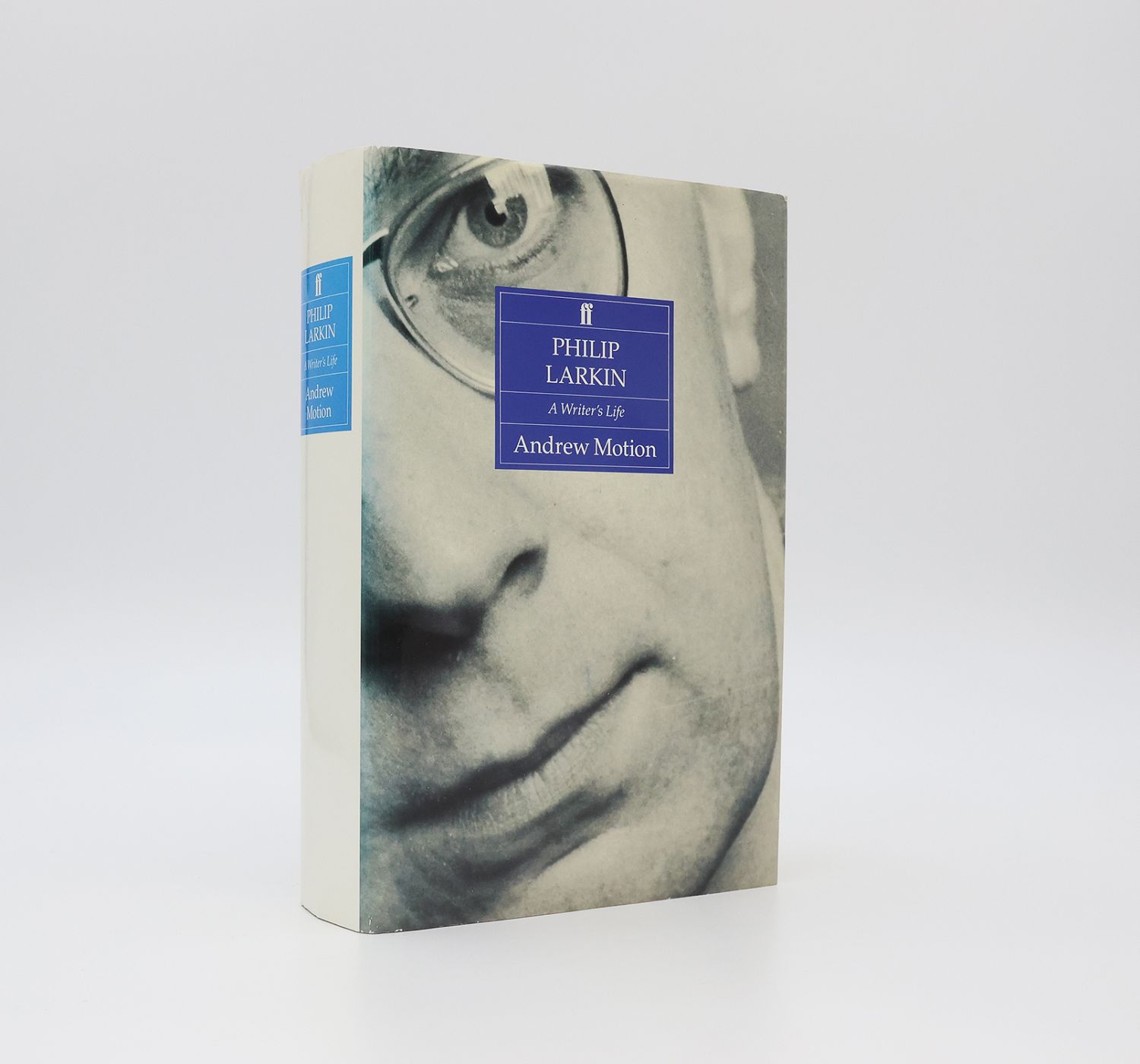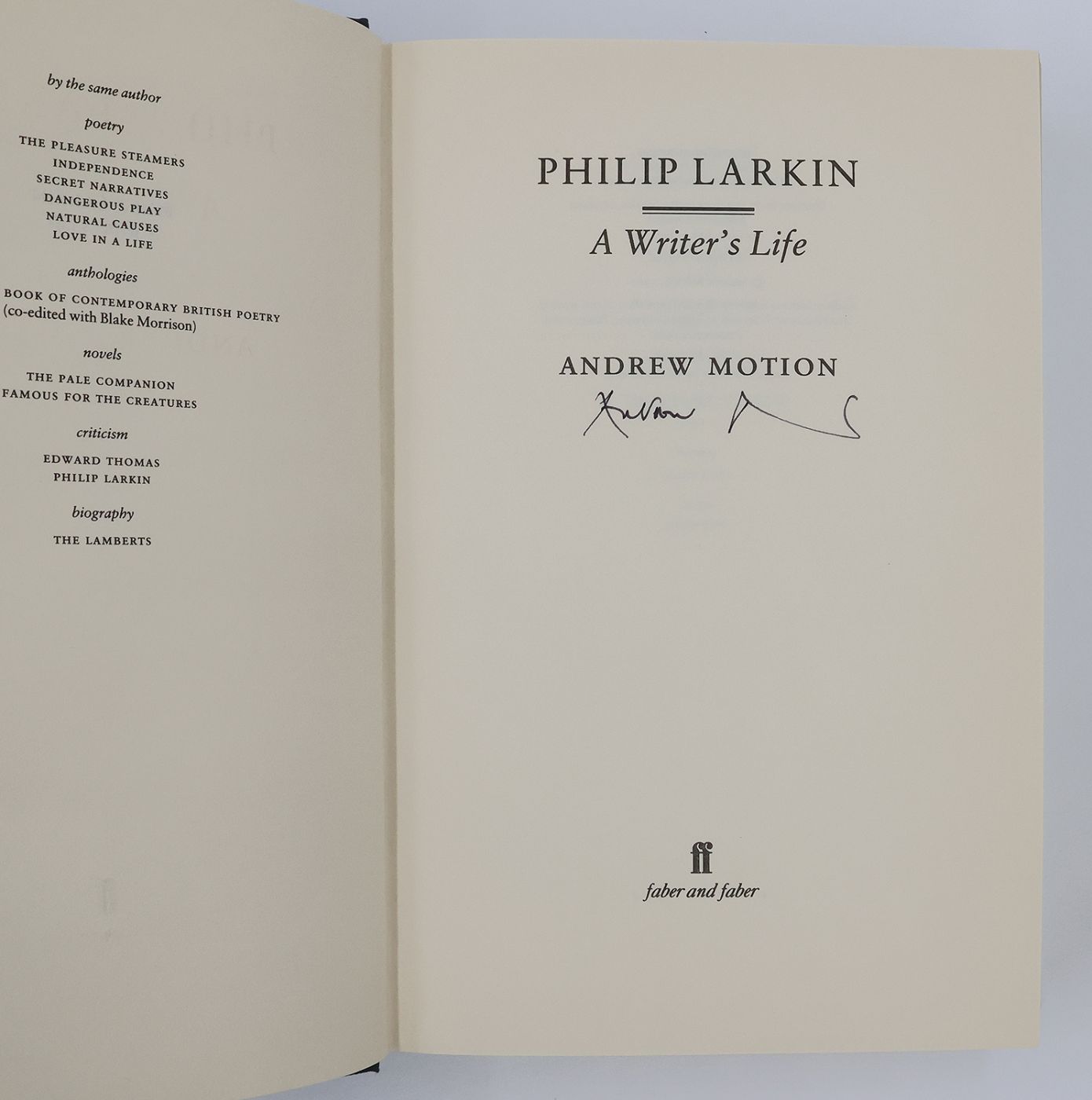PHILIP LARKIN: A Writer's Life
First edition, first printing. Signed by the author. From the library of Professor Edwin Dawes (1925-2023), with his distinctive bookplate to the front pastedown. Original black cloth lettered in white to the spine, in dustwrapper. A very near fine copy, the binding square and firm, the contents, with Dawes' distinctive bookplate to the front pastedown, clean throughout. The dustwrapper, a little faded to the spine, with some light edgewear and a closed tear (c. 2.5 cm) to the upper edge of the spine panel, is otherwise in very good shape. A nice copy.
Signed by Andrew Motion in black ink to the title page. From the library of Edwin Dawes (1925-2023), Reckitt Professor of Biochemistry at the University of Hull, later serving as the University's Pro Vice Chancellor, Dean of Science, and also as Chair of the Library Committee. Dawes first met Larkin in the latter's capacity as chief librarian at the university, but they soon became good friends. Dawes was later founder and chairman of the (posthumous) Philip Larkin Society. He was also an award-winning magician and historian of magic, which explains his Ex Libris bookplate showing an alchemist presiding over a steaming concoction with, at his left hand, a copy of Giovanni Battista Della Porta's 1558 'Natural Magick' (the figure bears an uncanny resemblance to Sigmund Freud). The design, he later explained, married his two passions of science and magic. At the time of his death in 1985, Larkin was something of a national treasure, "England's unofficial Laureate", as Martin Amis has it in a characteristically judicious essay-review of the US edition of Andrew Motion's authorised biography of the poet (New Yorker, July 1993). He reminds us that "[w]hen poets die, there is usually a rush to judgment: a revaluation, a retaliation – a reaction, anyway. We know how these things go, with the poets. He who was praised and popular is suddenly found to be facile and frictionless. He who was mocked and much-remaindered is suddenly found to be 'strangely' neglected." In Larkin's case, the backlash began with the publication of the 'Selected Letters' in 1992, which brought to light a number of ugly prejudices that were understandably pounced upon by reviewers. With the appearance of Motion's biography and its further revelations, the tide continued to turn. "The reception of the Life [in the UK]", Amis writes, "was marked by the quivering nostril, and by frequent recourse to the pomaded hanky, the smelling salts, and the sick bag. Writing in The Times, Peter Ackroyd attributed 'a rancid and insidious philistinism' to the 'foul-mouthed bigot'. Similarly, Bryan Appleyard saw, or nosed, 'a repellent, smelly, inadequate masculinity'", and so on. Amis, of course, had known Larkin since childhood and coolly redresses (without excusing) some of the charges levelled at the poet. He reminds us of the nature of a personal correspondence: "Words are not deeds. [...] In a correspondence, words are hardly even words. They are soundless cries and whispers; 'gouts of bile', as Larkin characterised his political opinions; ways of saying 'Gloomy old sod, aren't I?' or, more simply, 'Grrr'. Correspondences are self-dramatisations. [...] There is no public side to Larkin's prejudices, and nothing that could be construed as a racist act." And, as Alan Bennett writes in another fine, extended essay-review of the biography (London Review of Books, March 1993): "There remain the poems, without which there would be no biography. Reading [Motion's book] I could not see how they would emerge unscathed. But I have read them again and they do, just as with Auden and Hardy, who have taken a similar biographical battering."
Stock code: 27541
£65
Published:
Category
Modern First EditionsSigned / Inscribed
Literature
Poetry
Recent Acquisitions



